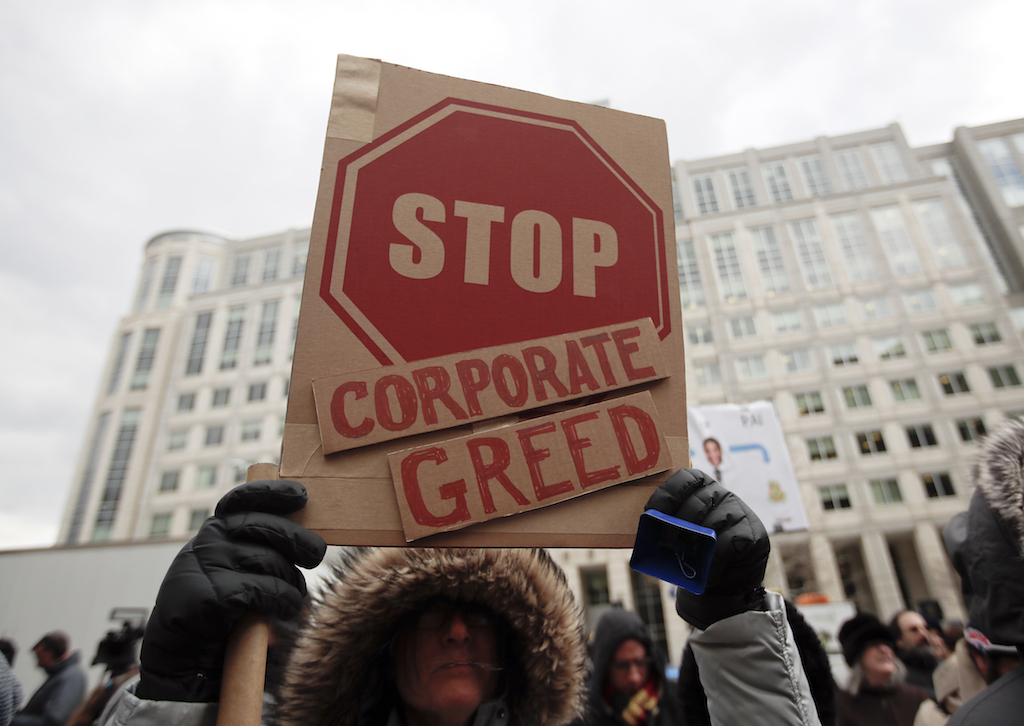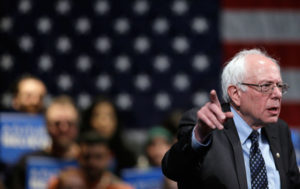Corporate America’s Latest Bill of Goods
To win favor with distrustful millennials, America’s CEOs are pushing the idea that they care about more than profits. Don’t believe it. A protest sign at a 2017 demonstration at the Federal Communications Commission. (Carolyn Kaster / AP)
A protest sign at a 2017 demonstration at the Federal Communications Commission. (Carolyn Kaster / AP)
One of the major themes in U.S. politics over the past decade or so has been the enormous influence that corporate America has over our political and economic life. Since the financial crisis erupted 10 years ago, populism has taken hold of the public imagination, and popular anger seems to have reached new heights as inequality has risen and corporations have grown more powerful.
The 2016 presidential campaign of Bernie Sanders succeeded in translating this anger into a political movement, and although the Vermont senator didn’t win the nomination, he drove the conversation and appeared to push the Democratic Party to the left. This has been evident since the 2020 primaries began earlier this year, with candidates adopting many of the policies and talking points that Sanders ran on in 2016. Railing against big business seems to have become a rite of passage for many Democratic candidates, especially if they want to appeal to younger voters, who, more than any other generation, distrust corporate America. According to a recent poll from Pew Research Center, just 34 percent of Americans aged 18 to 29 have confidence in “business leaders,” who are tied with “elected officials” as the group least trusted by this age group. Not surprisingly, the most popular candidate with millennials continues to be Sanders.
Recognizing the popular resentment that has been brewing over the past several years, especially among younger Americans, big-business leaders have been trying to step up their PR game in order to quell anti-corporate sentiments. This has been obvious in the efforts by many corporations to project a righteous and caring image to the public by getting behind certain liberal causes, such as gun control or criminal justice reform, a phenomenon that conservatives have derisively labeled “woke capitalism.” It has gone further than social and cultural issues, however.
Last month, Business Roundtable issued a widely publicized statement on “the purpose of a corporation,” and appeared to change its tune about the role of corporations in our society. Since 1997, the coalition of CEOs from the largest companies in America has espoused the Friedmanian line that corporations exist solely to “make as much money for their stockholders as possible,” without regard for employees, consumers, the community or any other “stakeholders.” Apparently, the leaders of corporate America have had a change of heart.
“It has become clear that this language on corporate purpose does not accurately describe the ways in which we and our fellow CEOs endeavor every day to create value for all our stakeholders, whose long-term interests are inseparable,” read the statement, which was drafted by the CEO of Johnson & Johnson, Alex Gorsky, whose company was ordered around the same time last month by an Oklahoma judge to pay $573 million for its role in fueling the opioid crisis. The statement goes on to say that corporations will invest more in employees by “compensating them fairly and providing important benefits,” supporting “the communities in which we work,” and delivering value to all stakeholders “for the future success of our companies, our communities and our country.”
This statement reveals less about the true feelings of America’s most powerful CEOs than it does about today’s zeitgeist and the desperate attempt by corporate leaders to convince the public that they’ve changed their ways. Not long after the statement was published, the former president of the pro-business group, John Engler, said that it was directed at millennials, who have increasingly come to prefer socialism over capitalism. Business leaders have “to tell the story differently,” Engler said. In other words, business leaders have to step up their propaganda game.
This sudden embrace of “stakeholder capitalism” by the leaders of corporate America didn’t impress such progressive candidates as Sanders and Elizabeth Warren, who one year earlier introduced a bill that would force major corporations to obtain a new federal charter that would require at least 40 percent of their boards of directors to be selected by the company’s employees. “I don’t believe what they’re saying for a moment,” Sanders told The New York Times, while Warren noted that it was “a welcome change,” but meaningless “without real action.”
One can discern a great deal about someone’s politics based on how much trust he or she puts in corporate America to do the right thing, and both Sanders and Warren have shown that they have very little faith in corporations to voluntarily put people before profit. The current Democratic front-runner, Joe Biden, on the other hand, has displayed a persistent faith in corporate leaders and billionaires to do what’s right for their country. “Guys, the wealthy are as patriotic as the poor,” the former vice president said in 2017. “I know Bernie doesn’t like me saying that, but they are.” In June, Biden repeated this mantra at a fundraiser on Wall Street, saying that Democrats shouldn’t “demonize anybody who’s made money,” and that “nobody has to be punished.” “Nothing would fundamentally change,” the front-runner insisted to Wall Street’s finest.
With calls for radical change to our economy gaining momentum in the Democratic Party, corporate America seems eager to convince the public that it can change its behavior on its own—purely out of the goodness of its heart. Nothing has to fundamentally change, because it can change itself. The attempt by big business to co-opt certain liberal causes and form alliances with activist movements is a good example of what political theorist Nancy Fraser has called “progressive neoliberalism,” describing a political alliance between corporate interests and emancipatory social movements, with the former using “the charisma” of their progressive allies to spread a “veneer of emancipation” over what is ultimately a regressive economic agenda. The progressive neoliberal aim, Fraser observes, is “not to abolish social hierarchy but to ‘diversify’ it.” This attitude is ultimately rooted in the myth of meritocracy that Democrats like Biden have long embraced.
The idea that we can trust corporations to suddenly stop putting profit over people is equivalent to the belief that Republicans will suddenly start working in earnest with Democrats, which is something that Biden also believes (even after eight years of serving as Barack Obama’s VP). Biden seems to have more faith in Republicans and benevolent billionaires than he does in his own party’s progressive base.
When we look at his history, Biden’s attitude toward corporate America isn’t surprising. As Paul Blumenthal recently pointed out in HuffPost, Biden spent his entire career as a senator “defending the uniquely pro-corporate laws of his home state, Delaware — laws that protect America’s biggest companies from taxes, lawsuits and accountability; fuel economic inequality; and prioritize the interests of shareholders over those of consumers, debtors and workers.” Delaware has less than one-third of 1% of America’s population, yet more than 60% of Fortune 500 companies are incorporated in the state because of its business-friendly governance laws. Business registration fees make up more than a quarter of the state’s income, and Biden never failed to defend his state’s corporate laws as a senator.
Warren’s aforementioned bill, the Accountable Capitalism Act, would mandate corporations with over $1 billion in annual revenue (meaning all Fortune 500 companies) to seek a federal charter from a newly formed Office of United States Corporations at the Department of Commerce, upending Delaware’s corporate charter monopoly and introducing a “codetermination” system of corporate governance in America. Biden, one can safely assume, would prefer to take corporate America’s word that it has reformed.
Over the past 40 years, capitalists have waged a class war on working people, and both major parties have been willing participants. Today, people are starting to fight back, and the popular energy is on their side. The specter of socialism is haunting the dreams of corporate executives, right-wing Republicans and neoliberal Democrats alike, and the effort to sell a new and improved image of capitalism to the public is underway. But “caring capitalism” is a contradiction in terms, and any candidate who believes that we can avoid major structural changes—and that corporations will voluntarily put workers, the community, their country or even the planet before profit—cannot be trusted by progressives.
Your support matters…Independent journalism is under threat and overshadowed by heavily funded mainstream media.
You can help level the playing field. Become a member.
Your tax-deductible contribution keeps us digging beneath the headlines to give you thought-provoking, investigative reporting and analysis that unearths what's really happening- without compromise.
Give today to support our courageous, independent journalists.






You need to be a supporter to comment.
There are currently no responses to this article.
Be the first to respond.